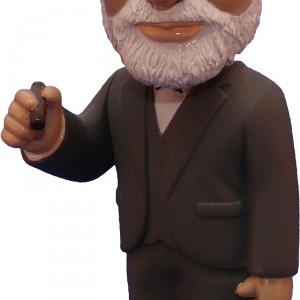 aNewDomain — What is psychology? In Introduction to Psychology, the No. 1 answer to that question is a tentative: the study of “why people do what they do?”
aNewDomain — What is psychology? In Introduction to Psychology, the No. 1 answer to that question is a tentative: the study of “why people do what they do?”
I don’t know why we do what we do, and I am a psychologist. If I knew the answer to that, I’d be a millionaire. But here’s my theory: We do things because we care.
But why do we care? Why do you care? Why does anyone bother?
Sigmund Freud’s idea of anxiety was that it was created by a conflict between what we ought to be doing, and what we are actua lly doing. In other words, when we are experiencing anxiety, we aren’t living in accordance with our own values. That does make some sense. You know your work is due tomorrow, and you haven’t started yet. You get an uneasy feeling. And sometimes you feel so uneasy that you just can’t get to the work.
lly doing. In other words, when we are experiencing anxiety, we aren’t living in accordance with our own values. That does make some sense. You know your work is due tomorrow, and you haven’t started yet. You get an uneasy feeling. And sometimes you feel so uneasy that you just can’t get to the work.
There are bills on the counter and you know you should pay them, that they need paying. Maybe you even have the money to do it  (although, this is America in 2015) but you can’t bring yourself to open the envelopes, see the damage.
(although, this is America in 2015) but you can’t bring yourself to open the envelopes, see the damage.
The more you don’t do it and know that you should, the more anxiety hangs out there and makes it hard to do. Frightening, even. But, really, why be scared of bills? They can’t literally hurt you.
There’s a behavioral explanation of anxiety, too, which comes courtesy of B.F. Sk inner, pictured at right.
inner, pictured at right.
Say there’s work you don’t want to do. You feel anxious about it. You therefore don’t do the work. Now you know if you feel anxious, you don’t have to do unpleasant or frightening tasks. So, next time something comes up in the same wheelhouse, you feel more anxiety.
The more you let anxiety get between you and work, the more you reward yourself for being anxious, the more anxious you become.
This also has some  application. For example, we psychologists often see this theory hold true in treatment.
application. For example, we psychologists often see this theory hold true in treatment.
And then there’s the opinion of the existentialist, Rollo May (pictured at left). He wondered if anxiety might be something of value, whether it is more than a communication or a symptom and more than a mere observable behavior. He wondered if it could be an important part of self.
Why do you get anxious about meeting new people? Asking someone out on a date? Going to a job interview?
Your values probably play a part, and past behavior probably does, too.
But May identified caring as the root of all human endeavor.
Why are you anxious about meeting new people? It’s because you care what they think of you. You’re anxious about asking someone out because you care whether they say yes, and all the implications that come with that.
And you’re anxious about that interview because you care about getting the job.
Why do you get up in the morning? Because you care about being awake. For whatever reason, you know lying in bed just isn’t going to cut it. You could get a backache, you will eventually need to use a toilet, you just can’t see yourself doing it, whatever.
 In any event, you care enough – maybe only just enough – to pull yourself up and get out of bed.
In any event, you care enough – maybe only just enough – to pull yourself up and get out of bed.
There’s a consequence here: When you experience anxiety, you have essentially two choices. You can deny your care, or you can own it.
You can attempt to detach from it, to push it away. You can forget expectations and outcomes and accept whatever happens, accept things just as they are. Or you can go right ahead and value the outcome, value the perceptions of others, value your perception of self.
Sometimes, detachment seems like the right course of action. When you can’t control everything, especially the things that are well beyond any reasonable possibility of control, these are the things to let go of. So you do what you can, control what makes sense to control, and let the rest go.
But try as we may to detach, there are things we really do care about, things that are at least somewhat within our circle of influence. And when those things disappoint us, we tell ourselves: Well, I don’t care about that. I don’t care what you think of me. I don’t care whether I win. I don’t care if you go.
I tell myself that about these blogs I write here at aNewDomain, and elsewhere. I don’t read comments and I don’t feed trolls. I tell myself: Look, if you want to write, let go of the idea of being popular or even really well-liked.
But I really do care. I tell myself I don’t, but I really do. When I see there’s a comment on an article, I experience anxiety. Why is that? It’s because I care what you think of me.
And I proceed to write, anyway.
Are you anxious? What are you anxious about? What does that tell you about your values, about what you care about? Now, knowing that, what are you going to do?
Don’t leave your answer in the comments below. I’m too anxious about them to ever read yours. Now if the editor here would just stop emailing them to me …
For aNewDomain, I’m Jason Dias.
Cover image: “Girl suffering from anxiety” by Bablekan at the English language Wikipedia. Licensed under CC BY-SA 3.0 via Wikimedia Commons. Image one: “Sigmund Freud Bobble Head Wackelkopf” by Gizlog – Own work. Licensed under CC BY-SA 3.0 via Wikimedia Commons. Image two: Bills, via ManVsDebt.com, All Rights Reserved. Image three: Behaviorist B.F. Skinner, via Brainsturbator.com, All Rights Reserved. Image four: Existentialist Rollo May, via pusatilmsikologi.blogspot.com, All Rights Reserved. Image five: Letting go and detachment, via divorcedmoms.com.













